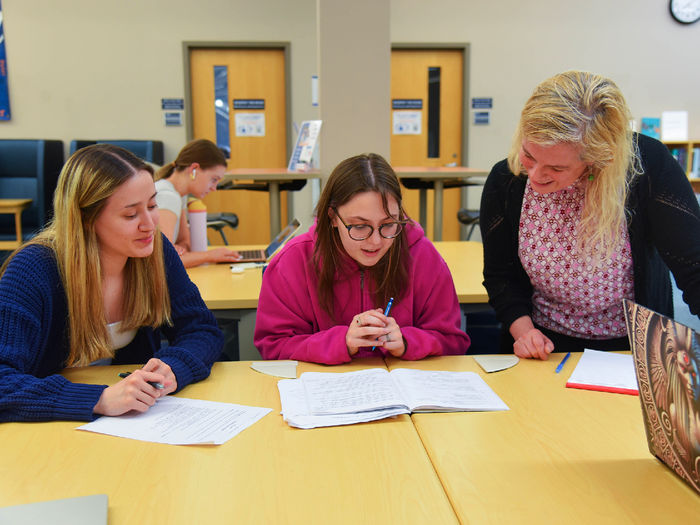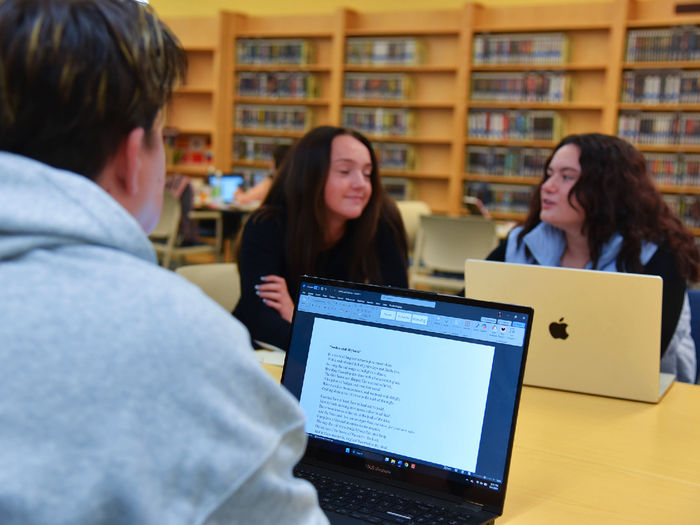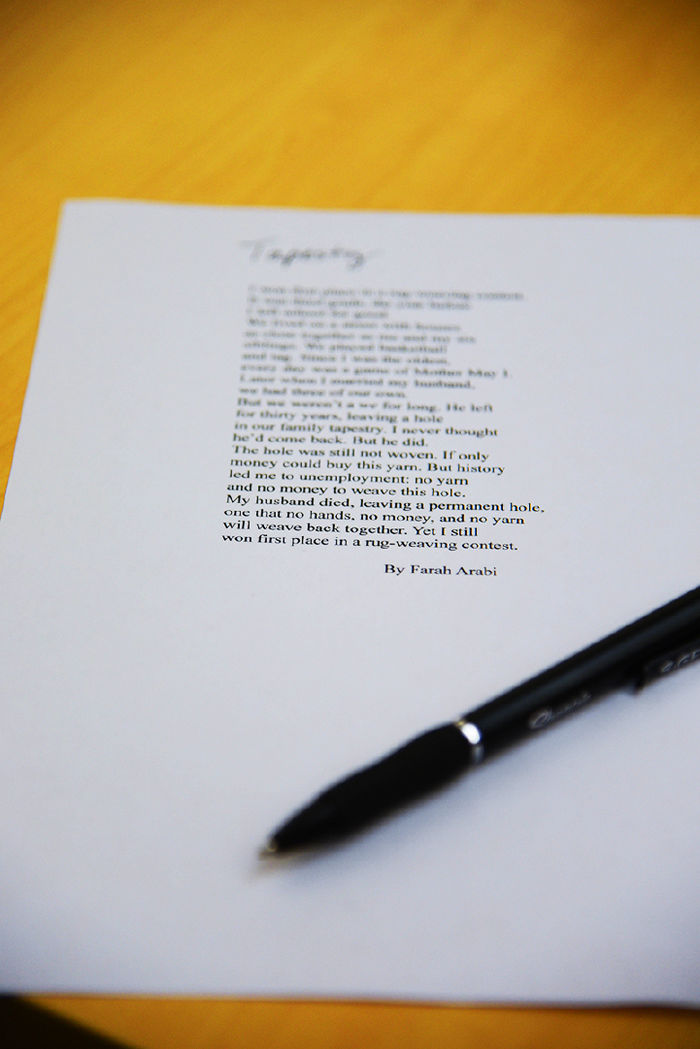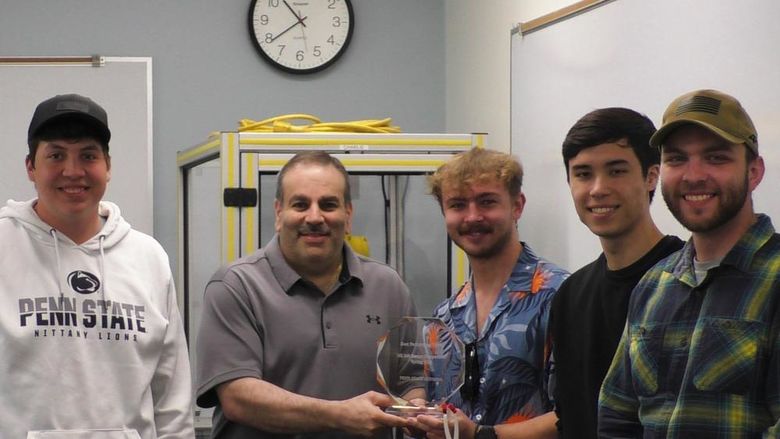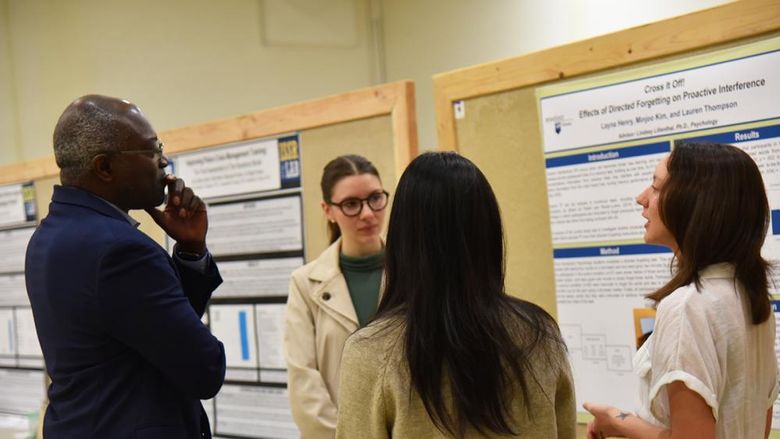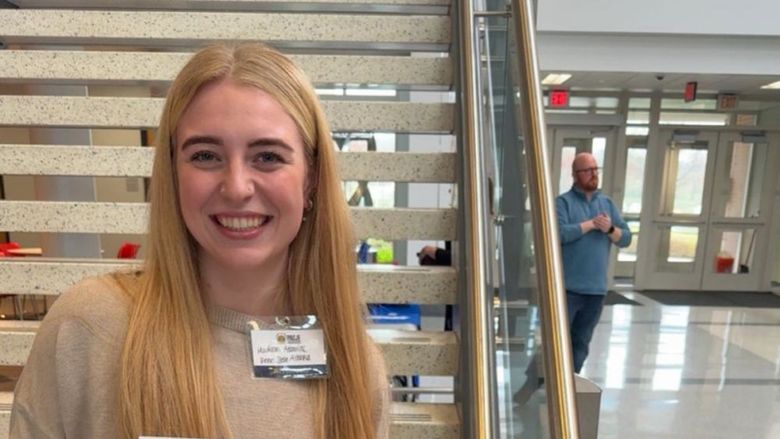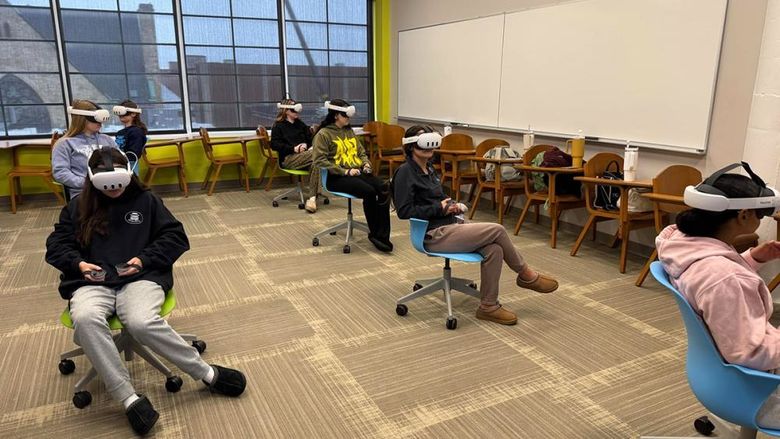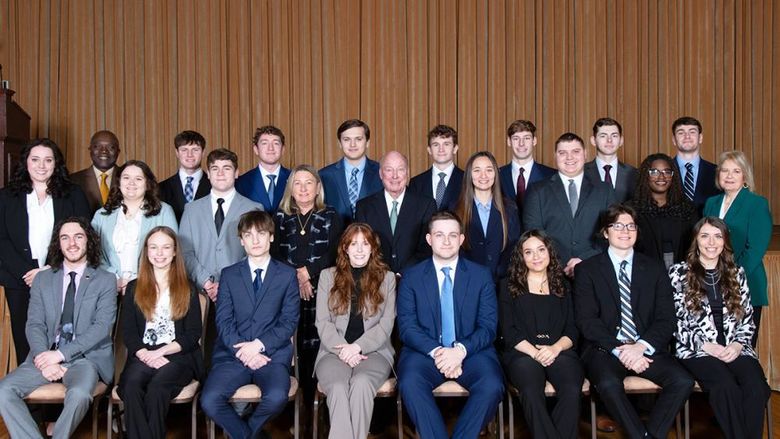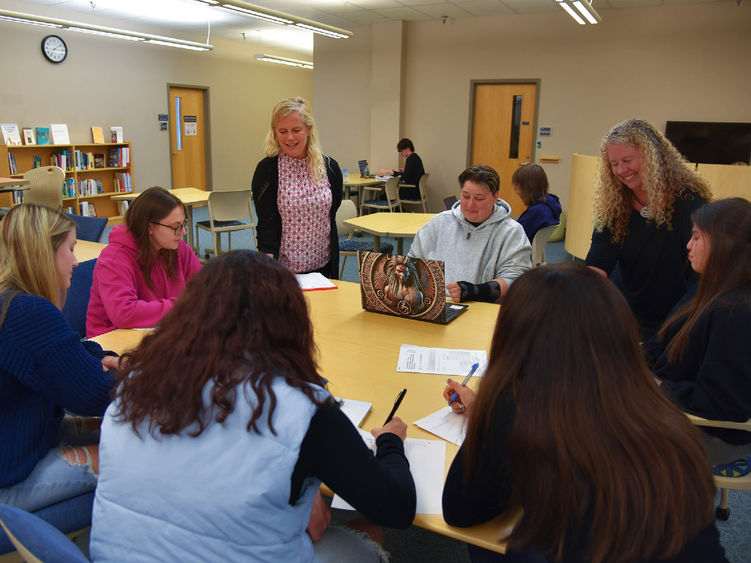
Students from the Perspective on Aging course meet with Kelly Munly and Erin Murphy to work on drafts of their Life Lines poetry.
ALTOONA, Pa. — Portraits aren’t just created with paints and a canvas or a camera and film; they can be developed with pen and paper, keyboard and screen. They can come into view through words. Not biographical or technical text, but something softer, something more profound — poetic portraiture — according to Erin Murphy, professor of English at Penn State Altoona.
Poetic portraiture is an art form that uses poetic language and techniques to go beyond a person's physical features, capturing life experiences, perspective and spirit. With words, it lays bare emotions, vulnerabilities and an essence.
Murphy came across a scholarly article about poetic portraiture and thought it would make for a great collaborative project, specifically, she said, with Kelly Munly, associate professor of human development and family studies (HDFS).
As a professor of English, Murphy works within a very different discipline than Munly, teaching fundamentally different concepts. They each have different ways of approaching and thinking about things. But those are some of the reasons why it’s a perfect interdisciplinary project for students, the campus and the community, said the pair.
The first step in the process of poetic portraiture is interviewing a subject. The goal, said Munly and Murphy, was to have HDFS students connect with older adults in the community, then craft poems based on their stories.
The two then introduced the program in spring 2024 in Munly’s "Development Throughout Adulthood" course.
Students learned about the project and about poetry, then practiced interviewing each other about their life experiences. With Murphy’s guidance, they created poetry about their partner from those interviews and shared them with the class.
“It is a little unusual in that I'm working with students who haven't probably ever read a contemporary poem or written their own poems,” said Murphy. “They aren’t literature students. But once they get over some of their fear and intimidation, they get excited about it.”
Pleased with the success of their soft launch, Munly and Murphy evaluated the process, made some adjustments and planned next steps.
Along the way, they said, they came up with a name that they feel perfectly encompasses the different aspects of the project: "Life Lines." Lines refer to lines of poetry, and lifeline as something that is essential for survival, with the result ultimately becoming a written piece of art describing a life or parts of it.
This spring, "Life Lines" became part of Munly’s "Perspectives on Aging" course. Students were given some instruction on poetry and trained in interview techniques. They practiced with each other, then, as part of the course’s practicum, paired up with an older adult resident in Midtown Oaks Health & Rehab Center in downtown Altoona.
Back in the classroom, Murphy guided students on drafting and revising their poems.
“I genuinely enjoyed learning about my resident," said student Mia Chin, who graduated in spring 2025 with a degree in nursing. "I found that I didn’t even need to use our interview prompts. It was just a friendly, organic conversation.”
However, Murphy said, she didn’t choose to collaborate with the HDFS program randomly. As the name suggests, HDFS focuses on families and individual development across the lifespan. It gives students the skills to be effective human services professionals. As such, its courses are populated by students not only in the HDFS major, but those studying things like criminal justice, education, psychology, and nursing or other health services.
“The idea is that 'Life Lines' goes beyond teaching students to write poems," Murphy says. "Yes, they're learning poetic techniques, but they're also learning about human connection and communication and empathy. These are skills that apply to a wide range of careers, including healthcare, social work, law enforcement, education and business."
"Life Lines" is about spawning skills these students can apply in their chosen careers, from educators to law enforcement, social workers to health care professionals and everything in between.
“This experience was helpful for me,” said Michael Balmforth, an HDFS major. “It gave me an idea of how I can connect better with a client in the future with empathy and understanding.”
The interview subjects themselves did not come away empty-handed, Munly said, noting that many of them enjoyed it so much they wanted to meet with the students again.
“Participating residents at Midtown Oaks expressed gratitude for the students' presence and engagement in conversation," added Munly. "One woman was so pleased, she asked if she could send postcards to some of them.”
Munly noted that, while the participating residents felt a bond with the students, perhaps more importantly they felt seen; they felt significant. In a culture where older citizens are often overlooked or dismissed, where their lives are trivialized and undervalued, giving them an opportunity to reflect on and share their lived experience was powerful and empowering, she said.
Matt Wracher graduated in the spring and said plans to pursue a career in criminal justice and security.
“Poetic portraiture validates personal identity and can create a legacy for participants," Wracher said. "In working with these older adults, I saw how it offers a meaningful way to look back on their lives and share their stories.”
Student Madelynn Hook, who is studying psychology and HDFS, agreed.
“Poetic portraiture can capture and honor someone’s experiences leading them to feel valued and heard,” Hook said. “I believe it encourages emotional connection, self-expression, and more profound understanding among generations.”
Both Murphy and Munly said they hope "Life Lines" will become an ongoing program. They’re discussing and developing ideas about how to share and showcase final poems to an audience beyond the students and seniors themselves. This could include a display at a public library, an exhibit on campus or something online.
Munly said she is considering ways to make the practicum the length of the semester rather than a week or so. Further, she’s examining ways to incorporate data from future interviews into research with students.
“I'm thrilled that students have the opportunity to build their research methods repertoire in an interdisciplinary context with leadership from Erin,” Munly said. “Interdisciplinarity not only yields a more comprehensive vision of research content, in this case interviews with older citizens, but also better prepares students for a life that runs on being facile across content areas and perspectives."
As Poet Laureate of Blair County, Murphy said "Life Lines" is the perfect crossover between her university and community roles. The volunteer position involves promoting poetry and presenting readings, workshops and other initiatives at schools, libraries and events in the community. She and Munly said they hope to pursue funding allowing them to offer "Life Lines" across Blair County. Students have suggested integrating storytelling and poetry workshops along with multimedia elements such as photography and audio — all to encourage community bonding, bridge age gaps, and provide opportunities for creativity and self-expression.
"I really enjoyed writing our poems in class. Applying poetic portraiture deepened my understanding of older adults and their life experiences, helping me connect with them on a more personal level,” said Farah Arabi, who is studying psychology and minoring in HDFS. “It also gave me the opportunity to practice and develop my poetry skills, and it became a meaningful outlet for expressing both my own voice and the voices of others."
